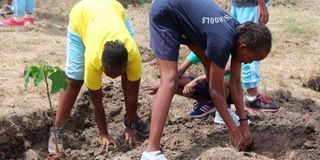Mindfulness skills equip a child for the 21st century

Pupils at Lukenya Academy in Machakos County plants a tree at their school.
What you need to know:
- Since the early 2000s, mindfulness in education has gained momentum worldwide, but especially in the UK and US.
- At the very least, it equips children with practices to live a healthier, happier life through being more self-aware early.
Mindfulness is being purposefully aware, in the present moment. The weave of mindfulness into mainstream schooling can empower and equip children for 21st century living in a world we can’t yet envision.
It is not airy-fairy woo-woo but teachable skills that should be part of the core curriculum of all schools. Covid-related stress and anxiety in children is on the rise, especially with the ongoing Omicron wave. Hybrid teaching, closure and reopening of schools is the “new normal” as we ride the tides of uncertainty caused by coronavirus mutations.
Since the early 2000s, mindfulness in education has gained momentum worldwide, but especially in the UK and US. Prof Katherine Weare wrote in her meta-analyses of scientific studies of mindfulness in schools that typically ran 10 hourly sessions a week that it “shows promising emerging evidence for impacts on academic grades, on problem behaviour and on physical health and wellbeing”.
The Dalai Lama advocates a holistic approach: “When educating the minds of our youth, we must not forget to educate their hearts.” The intended outcome is a more equitable and compassionate world, to tackle timely issues such as climate change, social justice and immigration. At the very least, it equips children with practices to live a healthier, happier life through being more self-aware early. It helps to build healthy habits to serve them for life.
Formal education is focused on the outer world but there is a whole inner one to explore. If we can be more self-aware from an early age, we may just help in averting stress, addictions and trauma — the subconscious operating systems for many of us.
Mindful curriculum
We do not need to wait until a mid-life crisis and therapy later. Weave mindfulness in the school systems and structures for children, teachers and parents — not as an add-on but a verb, to be practised and infused alongside the academics, sports and arts.
Though mindfulness has its roots in Eastern Buddhist philosophy, it is relevant to Kenya as there are many indigenous contemplative practices akin to it and which emphasise connection to the earth and to each other.
The spirit of harambee encompasses the knowing that we are all inter-connected and need to uplift one another. Chamas mobilise monetary savings through shared generosity of resources but also provide emotional support.
This knowing of our inter-connectedness is a part of the mindful curriculum and parallels existing cultural practices. Some schools have already adopted mindfulness interventions in Kenya and interest is growing.
The principles of mindfulness are universal. Typical components of the curriculum would include matters such as how to pay attention; relate to our emotions; respond, rather than react and cultivate self-acceptance and, dare I say it, even self-love.
Social, emotional and cognitive skills, which mindfulness address, are the ‘software’ that will be the operating systems for creating a fair and just society. As Gandhi said, let’s be the change we want to see.
Ms Smriti, a curriculum expert, is co-founder of Nurture ‘n’ Nature. [email protected]




